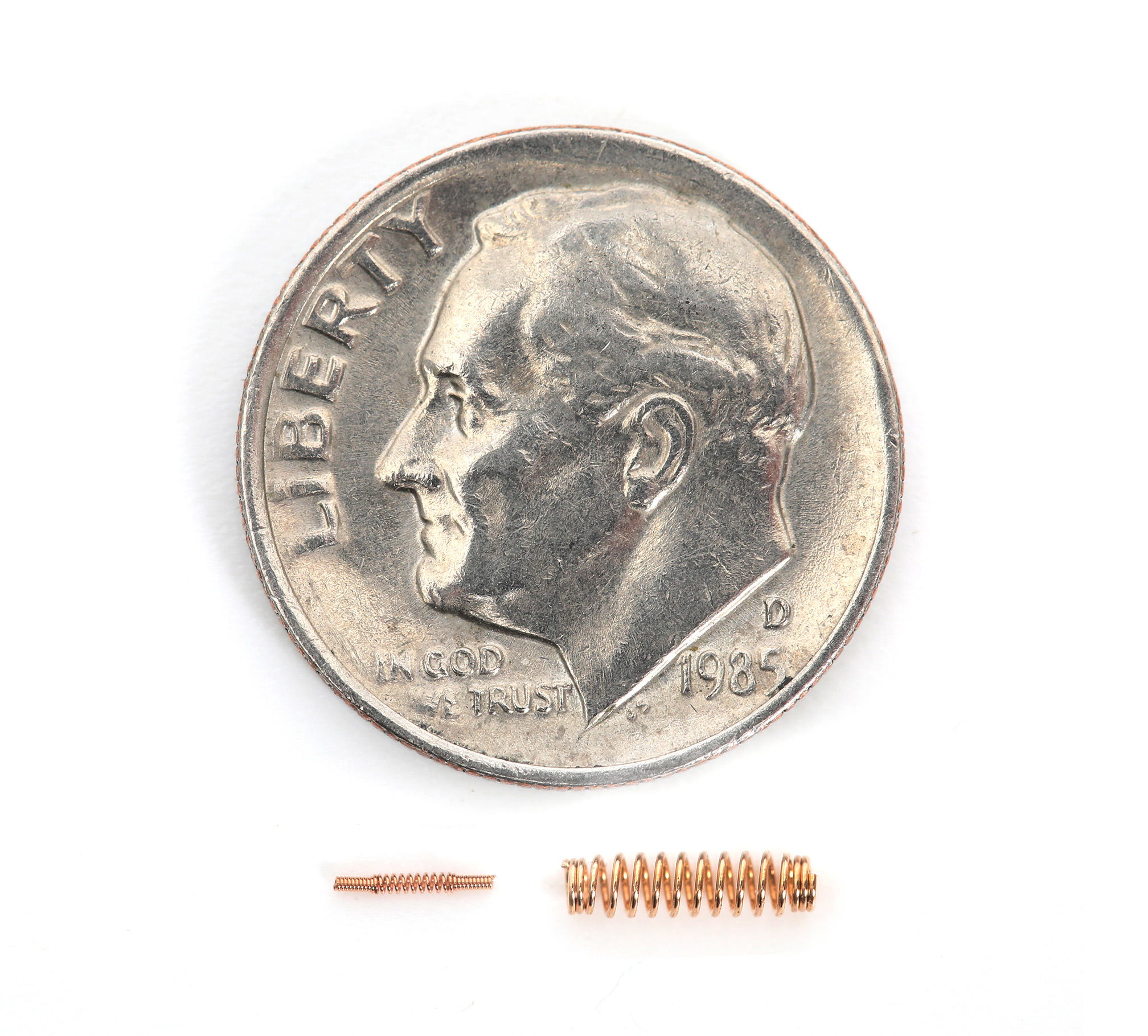As medical coiling technologies continue to advance, you need experienced micro coiling engineers, lightning-fast turnaround of custom designs, and high-quality products to keep pace.
Small wire coils are used in many medical components and an ongoing trend in the medical coiling industry is the ‘micro coil’ which can be as small as 0.001’’. Most devices that use micro coils are guidewires for interventional devices. The size of the human vasculature system requires these devices to be extremely small and micro coils help to treat specific areas within the anatomy.
Sometimes micro coils are embedded inside multiple components to give end users radiopacity (opaqueness to X-rays). Benefits for patients include shorter hospital stays and reduced post-surgery risks due to less invasive surgical techniques used. However, manufacturing micro coils presents special challenges, not only due to their size but also regarding the precision manufacturing equipment and expertise required.

Coiling Techniques
When it comes to producing micro coils, techniques can vary, explains Jim Boldig, director of engineering at Custom Wire Technologies (CWT). “We have two methods which we use to produce micro coils. We can use our coil winding machines, or we can use our point coilers. Each method has its advantages and disadvantages.
“However, our experience allows us to select the best method based on a variety of factors. Some of these factors include machine capacity, personnel scheduling, and tooling availability. Ultimately, CWT must consider what is best for the customer while working to achieve a production-ready program.”
CWT manufactures custom-designed prototypes for FDA approval processes and then follows into large productions as the customer grows in the market.
At What Size is a Coil Considered ‘Micro’?
“Small is a relative term, but it is common in the medical device industry,” says Boldig.
“CWT considers a wire ‘micro’ when diameters are less than 0.076mm. We also consider the coil diameter as part of this classification. When the coil OD (outer diameter) is less than 0.50mm we consider it to be a micro coil. These wire and coil diameters require specific processing equipment to achieve this level of miniature size.”
Materials and Quality Control
Micro coils can be manufactured from various metals and alloys including stainless steel, nickel titanium, platinum, and tungsten.
“Of the materials we work with, not one is better suited than the other,” notes Boldig.
“They all have their unique attributes and challenges. The question CWT asks of its potential customers is, what is needed for the particular device? CWT will determine the best method to manufacture the coil based on the customer’s needs.”
Working on such a small scale has its challenges, but CWT utilizes a fully developed Quality Management System with strict quality control procedures. This includes well-defined inspection procedures and preventative maintenance programs.
“Our personnel are trained by factory technicians and receive further on-the-job assistance to ensure adherence to specifications,” says Boldig. “All machine tooling is purchased direct from the factory to aid in the precise scale of these micro coils. While it may just be a machine manufacturing these coils, many processes have a significant impact on the end product.”
Specialized Expertise
CWT has a long history of working with micro coils, and Boldig believes this wealth of experience is essential to their successful manufacture. “Not all medical device companies can claim they have been producing micro coils since their inception. When CWT was founded in 2002, one of the first machines purchased was a machine which specialized in producing micro coils.”
Innovation is continuing at the Wisconsin-based firm, and most recently, the company launched its QwikCoil Program, which promises to deliver quality custom coils within just one week. This is proving to be highly valuable to manufacturers that require expedited turnarounds on their orders.
Boldig extolls the virtues of having an experienced manufacturer in charge of producing micro coils. “Through years of manufacturing, CWT has learned what works and what doesn’t when it comes to working with these micro coils. We know the techniques to be effective at manufacturing, inspecting, and even special packaging of these types of products.”
LET’S CONNECT!
To learn more about how Custom Wire technologies can serve you and your business, be sure to reach out! We look forward to hearing from you and learning how we can be of service.



